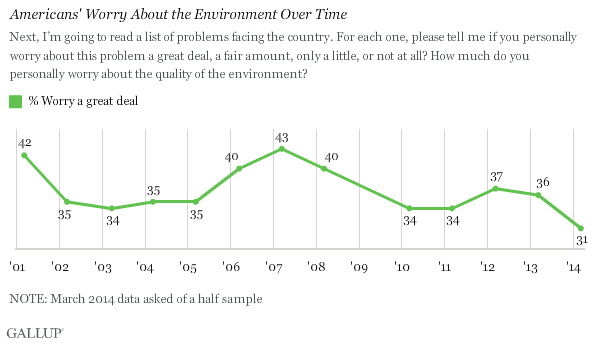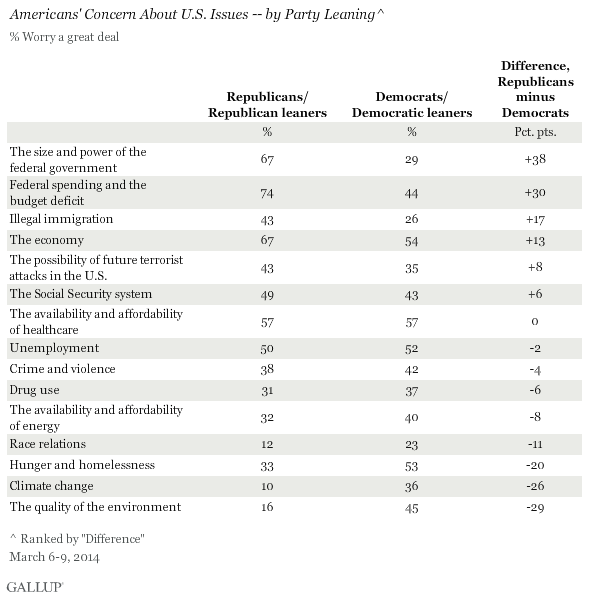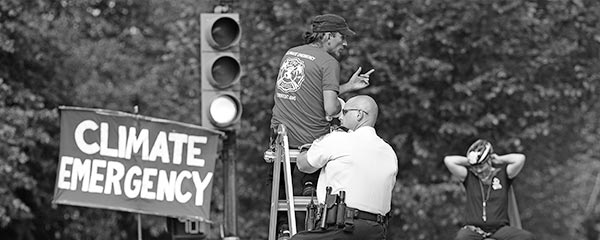This article is the first in a series that will analyze Gallup's latest March update on Americans' views on climate change and examine how these views have changed over time. The series will explore public opinion on the severity and importance of climate change, its causes and effects, the extent of Americans' understanding of the issue, and much more.
WASHINGTON, D.C. -- Twenty-eight U.S. senators held an all-night "talkathon" Monday to call attention to climate change, an issue that only 24% of Americans say they worry about a great deal. This puts climate change, along with the quality of the environment, near the bottom of a list of 15 issues Americans rated in Gallup's March 6-9 survey. The economy, federal spending, and healthcare dominate Americans' worries.

This was the first year Gallup included "climate change" in the list of worries tested in the annual March Environment survey. Americans are less worried only about race relations than they are about climate change. The majority of Americans say they worry about these two issues "only a little" or "not at all"; more than half of Americans worry about the other 13 issues at least "a fair amount."
Thirty-one percent of Americans indicate that they worry "a great deal" about the quality of the environment this year, marking the lowest level of worry about the environment more broadly since Gallup began measuring this in 2001. Americans were most concerned about the environment in 2007, when 43% worried a great deal.

Worries Differ Greatly Between Political Parties
Americans from the two major political parties express different levels of worry about a number of the issues tested, including climate change and the environment. Among Democrats and Democratic leaners, 45% say they worry a great deal about the quality of the environment. This percentage drops to 16% among Republicans and Republican leaners.
Gallup finds a 26-percentage-point difference in worry about climate change, with Democrats again more likely than Republicans to worry a great deal. Democrats, conversely, are much less worried than Republicans about the size and power of the federal government, and about federal spending and the budget deficit.

Republicans over the last few years have been more worried than Democrats about the economy and governance issues, while Democrats have been comparatively more worried with social issues such as race relations and homelessness. Although more Democrats than Republicans worry about the environment, climate change, and race relations, these are not major worries for most Democrats. The affordability and availability of healthcare and unemployment are two economic issues that Republicans and Democrats worry about equally.
Implications
Climate change and the quality of the environment rank near the bottom of a list of concerns for Americans, who are instead far more worried about more basic economic issues such as the economy, federal spending, and the affordability of healthcare. Concerns about the environment typically rank low among all Americans, but the current level of worry is even lower than in the past.
It is unclear whether or to what extent the senators' actions Monday will raise Americans' concern about climate change or the environment. But unless Americans' concern increases, the likelihood of the public's support for significant legislative action on environmental matters is small.
Survey Methods
Results for this Gallup poll are based on telephone interviews conducted March 6-9, 2014, on the Gallup Daily tracking survey, with a random sample of 513 adults, aged 18 and older, living in all 50 U.S. states and the District of Columbia.
For results based on the total sample of national adults, the margin of sampling error is ±6 percentage points at the 95% confidence level.
Interviews are conducted with respondents on landline telephones and cellular phones, with interviews conducted in Spanish for respondents who are primarily Spanish-speaking. Each sample of national adults includes a minimum quota of 50% cellphone respondents and 50% landline respondents, with additional minimum quotas by time zone within region. Landline and cellular telephone numbers are selected using random-digit-dial methods. Landline respondents are chosen at random within each household on the basis of which member had the most recent birthday.
Samples are weighted to correct for unequal selection probability, nonresponse, and double coverage of landline and cell users in the two sampling frames. They are also weighted to match the national demographics of gender, age, race, Hispanic ethnicity, education, region, population density, and phone status (cellphone only/landline only/both, and cellphone mostly). Demographic weighting targets are based on the most recent Current Population Survey figures for the aged 18 and older U.S. population. Phone status targets are based on the most recent National Health Interview Survey. Population density targets are based on the most recent U.S. census. All reported margins of sampling error include the computed design effects for weighting.
In addition to sampling error, question wording and practical difficulties in conducting surveys can introduce error or bias into the findings of public opinion polls.
View survey methodology, complete question responses, and trends.
For more details on Gallup's polling methodology, visit www.gallup.com.
